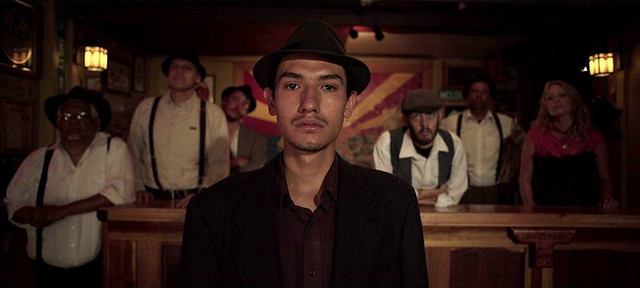
Robert Greene's engrossing historical reenactment, Bisbee '17 serves as not only a forgotten history lesson but also perhaps the largest scale role playing art therapy session. Bisbee, Arizona, a dusty small town near Mexican border, once was a richest town in the state, is also dubbed as Copper Queen for its mineral resources during WWI military effort. A large open pit mine with the blood red contaminated water in the middle, now closed, serves as a reminder of its history in its not so subtle metaphor. And yes, there is nothing like a large scale war to trigger its citizens of their sense of patriotism and unfettered exploitation by the government and industry.
If you are familiar with the American Labor history, you know that it was WWI that effectively quashed the burgeoning labor movement in this country. Happened in New York, Chicago and Butte, Montana and all over where people were violently oppressed. And it happened in Bisbee in 1917, by armed sheriff department and 2,000 deputized citizens to round up its 1,800 inhabitants - immigrant miners, mostly Mexicans and Eastern Europeans, IWW (Industrial Workers of the World) strike organizers and supporters, and put them in cattle cars and deport them out of town, to New Mexican desert, presumably to die.
To mark the centennial of the occasion, some town historians and artists decide to enact the shameful history and Greene is there to document it. They are making a movie, where townsfolk play key figures of that shameful history. There are half-dozen key figures but the Greene keeps focus on the Rays and Fernando Serrano. They are in it for different reasons. The Ray brothers- Mel and Steve, by their mother's urging, will portray Edward and Archie, the brothers who were on the opposing side - Edward (their grandfather), deputized mob on behalf of the Phelps-Dodge Co. and Archie, a striking miner. Serrano, a young, soulful eyed apolitical Bisbeean whose mother was deported when he was 7, joins in out of curiosity. Except for some town's elders and artists, the Bisbee Deportation is long forgotten by the public, not taught in schools. And the only remaining records of it are that of the mining companies as they controlled the town newspaper, radio and telegrams. With those who remember and want closure, Greene embarks on perhaps his most ambitious project- as far as 'process is just important as the product' filmmaker is concerned.
Greene, always interested in the nature of playing a role in fiction and in real life, once again blurs the line here with Bisbee '17. As the centennial celebration and its enactment approaches, things get tense and emotional. And it reflects perfectly the current nightmare we are living in where immigrant children are in cages and their parents deported. History repeats itself. But the film ends on a hopeful note. Greene is not only a good filmmaker but a great teacher. Serrano belongs to the generation which will inherit this country very soon, is awoke. The film deeply affected me deeply on an emotional level.